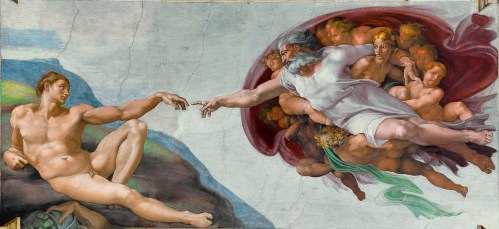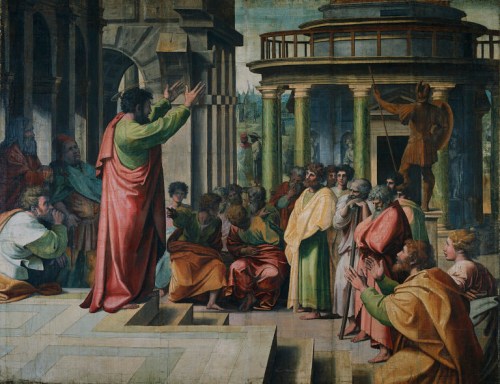 A response to the blog post : “Reason’s Why Being Good Will Not Save You.” by philipmcclelland.org, at the Necked Christian Blog .
A response to the blog post : “Reason’s Why Being Good Will Not Save You.” by philipmcclelland.org, at the Necked Christian Blog .
Agnosticism is a question and not an answer
I told the writer Philip from the blog post listed above that I would be sure to respond because I call myself an agnostic and rightly so “I do not know.” To make such a claim may seem out of place around circles of belief, but in fact we do not know until we by some means of study or experience, that is repeated do we know. And in the matter concerning knowing if there is a deity or if one exists I can rightly say “I do not know.” Even the great Richard Dawkins takes a swing at agnostics every now and again. I call myself agnostic so as not to align myself with atheist extremism that many sign up for. I am able to sit on the fence and visit the sheep pens of both belief and non-belief, and hold and consider ideas within that most in some groups might find repulsive. And one topic I find interesting is the idea that evangelical Christians have that simply doing good will not get you into the “Isles of the Blest” nor even squeeze you under the tall golden gates that surrounds the divine city.
Stolen Rewards
“He who receives a prophet in the name of a prophet shall receive a prophet’s reward; and he who receives a righteous man in the name of a righteous man shall receive a righteous man’s reward. And whoever in the name of a disciple gives to one of these little ones even a cup of cold water to drink, truly I say to you, he shall not lose his reward.” -Matt 10:41-42
As I was thumbing through the biblical literature I was delighted to come across texts relating to the topic at hand that clearly show that works and not simply belief will be rewarded. I think as nonbelievers, especially those out of evangelicalism have been told that works count for nothing have led to a self fulfilling prophesy where they feel it to be the case and give up. Oh how I wish for a contest for good! Imagine what a little competition would do along with bragging rights if folks were to compete for the highest forms of virtue and justice. Churches compete for the lost, prayer cards signed accepting Jesus, testimony contests, healing, and a bunch I’m forgetting. By heavens! If it were not for the good apostle Paul being the hypocritical “all things to all people”, and his writing accounting for a large portion of the Christian textual cannon, I’m afraid we would have to account for doing a lot more then we do. Which is why one of my favorite texts from the early Christianities is the book of James and also the text of Matthew 25. In the parable of the sheep and goats it appears that there are some who have done correctly and have done virtue and justice and didn’t even know it. Also these good folks seemed surprised.
Then the righteous will answer him, ‘Lord, when was it that we saw you hungry and gave you food, or thirsty and gave you something to drink? And when was it that we saw you a stranger and welcomed you, or naked and gave you clothing? And when was it that we saw you sick or in prison and visited you?’ And the king will answer them, ‘Truly I tell you, just as you did it to one of the least of these who are members of my family, you did it to me.’ – Matthew 25:37-40
So the the Good Samaritan did not need to believe Romans 10:9-10 to put the robbed and beaten on his donkey and take him to the inn. Nor did the text say the chap prayed the sinner’s prayer before he offered to pay all expenses. So to me it seems that believers have been stealing the rewards of virtue and justice done by non-believers for the selfish desires of heaven. Which results in the conclusion or main idea to the Necked Christian’s blog post, doing good for heavenly favor through belief rather then through perusing the highest forms of virtue and justice.
“It doesn’t change the what we do or should do, but it changes the why we do it and where it comes from. But most of all it gives to us a freedom we didn’t have before because are freed up to set aside selfish pursuits that take so much time and energy and focus on what bring goodness and light to the world. In all of this there is absolutely no need to try to prove ourselves or wear our good works on our shoulders because we already have all we will ever need in the love of God through Jesus.”
How I wish such a statement were true. Many beat themselves up for falling short and not meeting their peer and divine expectation, and the results of the above statement is in reality quite the opposite. It freed everyone up so much that many do nothing and look down smugly on the bragging non-believer who is doing the work!
It is far better to suffer injustice then to commit injustice
So I became vexed about the issue of evangelicals stealing all my good works towards justice and virtue and locking it into the vault of belief. I was relived when the answer to the whole issue came about while reading the dialogues of Plato. In the dialogue “Gorgias”, the discussion opens with a conversation by Socrates and Gorgais on the nature of his art, which was Oratory. However conversation and the main idea quickly moves to ethics. I would encourage everyone to read the dialogue in full for it is quite moving. We read the main idea of the dialogue below.
“And of all that has been said, nothing remains unshaken but the saying, that to do injustice is more to be avoided than to suffer injustice, and that the reality and not the appearance of virtue is to be followed above all things, as well in public as in private life; and that when any one has been wrong in anything, he is to be chastised, and that the next best thing to a man being just is that he should become just, and be chastised and punished; also that he should avoid all flattery of himself as well as of others, of the few or of the many: and rhetoric and any other art should be used by him, and all his actions should be done always, with a view to justice.” – Georgias by Plato, Translated by Benjamin Jowett
To say the least it was quite moving to read and it made this dialogue one of my favorites and I use the ideas of Plato from this dialogue as much as I can. The above statement told me that I am to work towards justice and virtue in all things and when I fall short I should bring it to light and pay the consequences. And as an agnostic I am most concerned with the life of the living and bringing that about, and not the afterlife. What kind of wretches would we be if we are to put bars on good works, chains on deeds of compassion and kindness, and setting the non-believer up for failure with theology, while hording the gains of heaven in an afterlife. And so Socrates states below one should be held accountable for our actions in real time. Just as those in Matthew 25 were quite surprised, believing themselves just, when in action they were not. So I will continue doing good deeds and what is just in nonbelief and suffer the injustice of theology. For it is far worse to commit injustice. And as it seems one should live by example. For talk and preaching is no use to us.
“Then rhetoric is of no use to us, Polus, in helping a man to excuse his own injustice, that of his parents or friends, or children or country; but may be of use to any one who holds that instead of excusing he ought to accuse—himself above all, and in the next degree his family or any of his friends who may be doing wrong; he should bring to light the iniquity and not conceal it, that so the wrong-doer may suffer and be made whole; and he should even force himself and others not to shrink, but with closed eyes like brave men to let the physician operate with knife or searing iron, not regarding the pain, in the hope of attaining the good and the honorable; let him who has done things worthy of stripes, allow himself to be scourged, if of bonds, to be bound, if of a fine, to be fined, if of exile, to be exiled, if of death, to die, himself being the first to accuse himself and his own relations, and using rhetoric to this end, that his and their unjust actions may be made manifest, and that they themselves may be delivered from injustice, which is the greatest evil.” -Georgias by Plato, Translated by Benjamin Jowett
Written by A. D. Wayman









Recent Comments